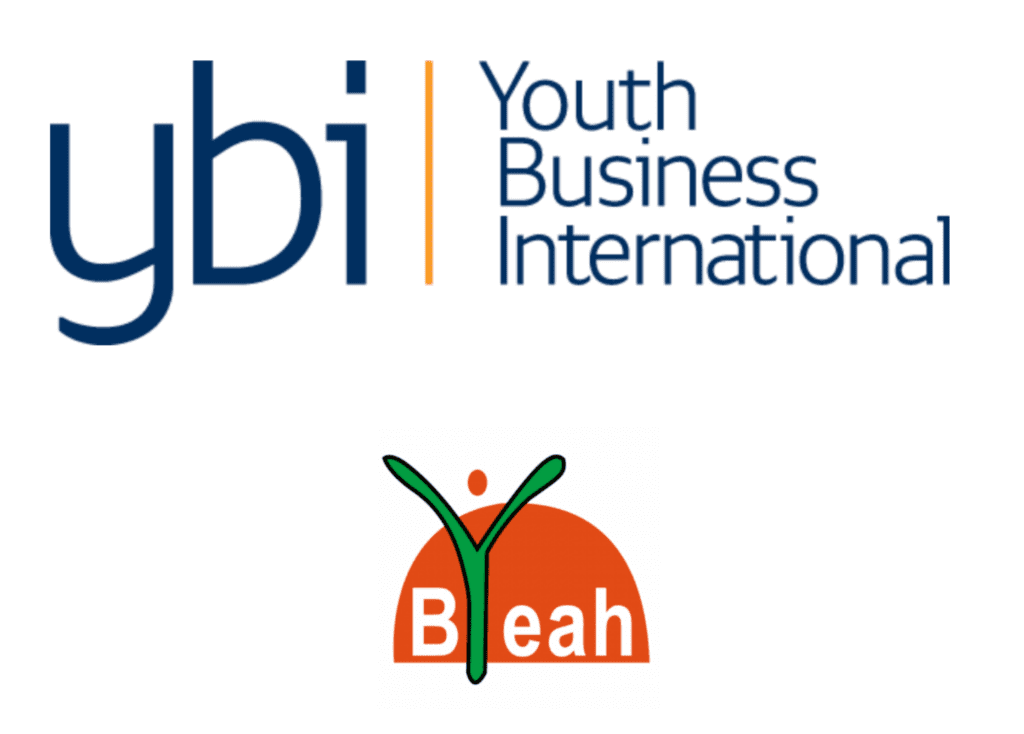
With the aim of equipping young people in Bangladesh and India with entrepreneurship skills and supporting new and existing micro-, small, and medium-sized enterprises (MSMEs), Catalystas conducted research on the current state of Decent Work in both countries, specifically within B’YEAH and BYST programming. Based on research, the team developed and organized a Training of Trainers (ToT) program curriculum on Decent Work practices, inclusive and safe workplaces, and how to provide fair income and social protections tailored to program participants.After a round of piloting, a nine-module online ToT was held for 22 participants of B’YEAH and BYST. The participants found the training highly applicable and will use the translated videos when training young entrepreneurs. The Catalystas’s team also facilitated YBI’s dissemination of the lessons learned and best practices to their membership at large.
Covid-19 impact in both countries hampered travel, and the team conducted both the research and the Decent Work training remotely. Relevant Covid-19 mitigation strategies on health and sanitation were incorporated into the training.
YBI is the leading organization supporting youth entrepreneurship worldwide with 52 active members in 45 countries. In August 2019, YBI, together with the IKEA Foundation, launched the three-year “Accelerating Youth-Led Businesses in the Digital Era Programme” in rural Bangladesh and India aimed at helping youth break the poverty cycle. The program set out to create 6,200 decent jobs by delivering culturally relevant entrepreneurship training, mentorship, and access to business loans for 3,200 young people to start or scale 2,500 new and existing MSMEs for the 21st century global economy. The program is Implemented and delivered in three locations in Bangladesh by B’YEAH and four locations in India by BYST.
The program aims to align with national, social, and economic realities. This includes mechanisms to ensure that the businesses and jobs created establish pathways to equitable, inclusive, and sustainable economic growth; full and productive employment; and Decent Work for all — an internationally recognized concept based on the International Labour Organization (ILO) labor standards and reflected in UN Sustainable Development Goal 8.
Bangladesh has experienced a recent period of economic growth driven mainly by exports in the garment sector, but working conditions remain among the worst in the global garment industry. At the same time, the country faces daunting challenges; approximately 39 million people still live below the national poverty line, resulting in increased levels of vulnerability, and there are overwhelmingly high rates of underemployment, especially for highly educated youth and women.

In Bangladesh the industrial sector accounts for 35.1% of GDP and employs 20.4% of the population, primarily in the ready-made garment and light manufacturing sectors.
Bangladesh has signed a number of international conventions on Decent Work and embedded Decent Work standards into many national laws and regulations, including granting men and women equal rights in the public sphere under the Bangladeshi constitution. However, these rights and standards are not regularly enforced, and the country is perceived as having weak legal protections for workers, lack of transparency in labor law, and an unwillingness to enforce inspection and remediation. Corruption, as well as a severe lack of regulation, plagues the informal sector where the majority of the population (87%) are employed. Informal enterprises usually do not pay taxes or qualify for social protections and are often subject to lower wages and substandard working conditions.
Despite the ILO conventions, accompanying policies, and numerous national laws, an estimated 1.2 million of Bangladesh’s children are engaged in the worst forms of child labor. Most notably, the garment industry continues to operate with 14–16 hour work days in unsafe, small, and hazardous spaces despite making global headlines due to a series of high fatality industrial accidents in 2012 and 2013.
India had one of the fastest growing economies worldwide before a slowdown in 2019 and the Covid-19 crisis impacted the country in 2020. The pandemic led to an increase in unemployment, particularly among educated youth, who reached a level of 60% at the end of 2019, compared to an overall unemployment rate of 7.5%.
Working conditions in India are governed by law based on ratified ILO conventions, including those on forced labor, child labor, and equal remuneration. Safe working conditions are provided for in the Constitution but these articles are deemed Directive Principles and are not enforceable in the court of law. Laws governing specific Decent Work standards and grievance mechanisms have been adopted, such as the Prevention of Sexual Harassment at the Workplace (PoSH) Act of 2018, but enforcement is limited, and the majority of these laws do not apply to businesses with fewer than 20 workers. In a country where an overwhelming majority of registered businesses are considered micro-businesses, and the majority of the workforce is employed in the informal sector, Decent Work standards are often not practiced. Child labor and forced labor are prohibited by law, but it is estimated that millions, as much as 7% of all child laborers worldwide, are working in India.
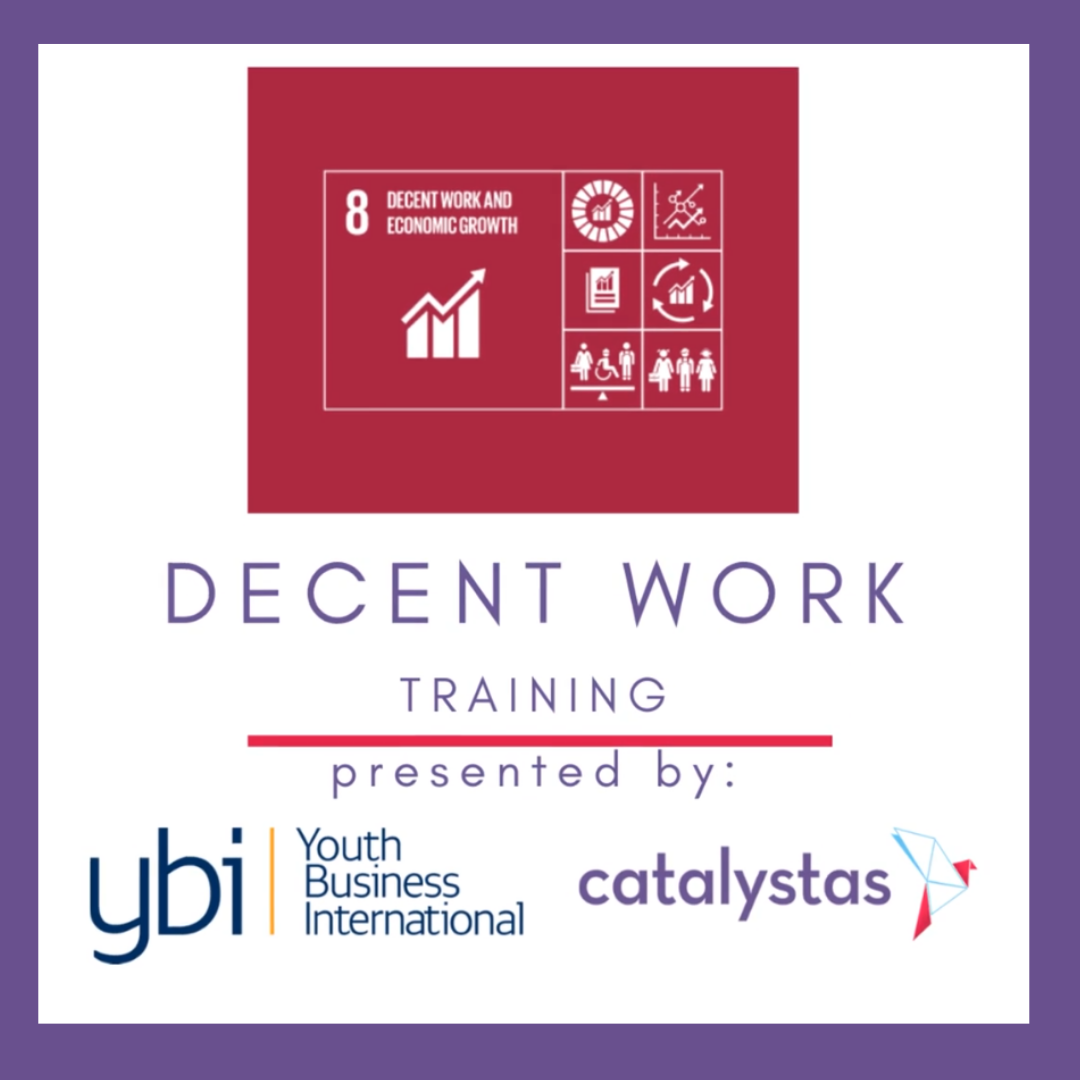
Catalystas started off with a literature review on the current status of Decent Work regulations and legal frameworks at the international level and how this influences labor laws and regulations in both project countries. The applicability to start-ups and MSMEs was also taken into account, as well as the enforcement of and compliance with these regulations. Enforcement and compliance were found to be major gaps in the status of Decent Work in start-ups and MSMEs. In both countries, there is no shortage of laws and regulations concerning Decent Work principles ranging from child labor to occupational health and safety issues. However, enforcement of these laws is not structurally implemented and many do not apply to the small businesses and start-ups that the YBI members work with.
Similar issues were found In the primary research stage of the project, including analysis of Key Informant Interviews (KIIs) and Focus Group Discussions (FGDs). KIIs designed to validate the high-level challenges in implementing Decent Work from the literature review were held with program staff of YBI, B’YEAH, and BYST in both international headquarters and regional offices. Through insights into the ways of working of B’YEAH and BYST and the support they provide, the team could filter the most relevant and practical information into a Decent Work training framework with each organization’s own program participants in mind, allowing the team to tailor the future training programs to the needs of the organizations. BYST and B’YEAH staff placed decent wages, working hours, occupational health and safety, and social security — especially in a Covid-19 context — as most relevant for the Decent Work training based on their observations of the youth participants.
The FGDs with entrepreneurs — women and men from all relevant locations — gave additional insights into the entrepreneurs supported by BYST and B’YEAH and their general level of education, age, gender, and sector, as well as perceived risks and challenges and their disproportionate effects on women, motivation to become an entrepreneur, and the support they seek. In addition, the FGDs allowed the team to assess specific attitudes and to take into account the context of the localities where the program is implemented. Some examples of the findings that helped shape the training were child labor not being regarded as an issue that applied to the context of the entrepreneurs, the lack of written contracts, and the entrepreneurs in both countries being committed to providing Decent Working conditions through compliance.
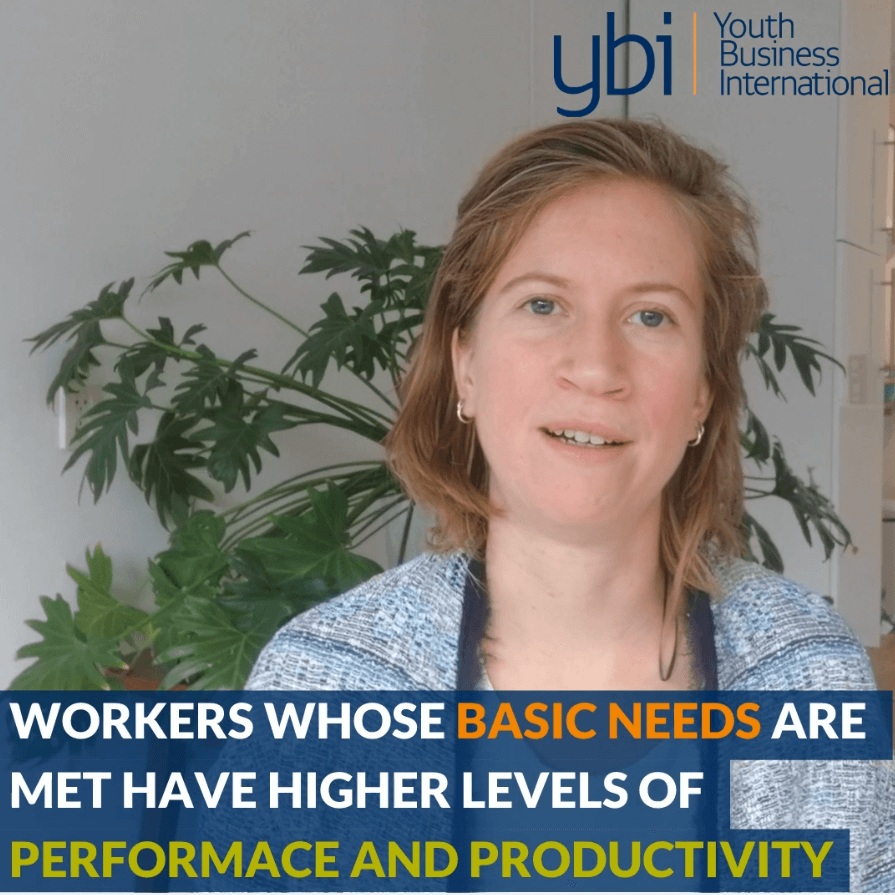
Based on the research findings, a virtual nine-module Training of Trainers program was developed. Two pilot trainings were held with participants representing YBI, BYST, and B’YEAH, as well as the broader YBI audience. Over nine days, nine modules consisting of instructional videos, exercises, tailored checklists on each principle in question, and additional resources including articles and videos were released for students. Each module covered one Decent Work principle. The modules on principles were preceded by an introduction video and followed by a final video and checklist with practical recommendations. After the pilot, feedback sessions were held with the participants of each training to gather their feedback and distill what adjustments to the training were necessary.
In the final version, Facilitator Guides and Participant Guides for BYST and B’YEAH staff were added, with additional guidance on how to integrate Decent Work practices and principles into existing training and support services for their program participants. A Final Brief summarized the research and provided recommendations on how to execute and operationalize the Decent Work training program and ways to expand the programs across YBI’s greater network.
Throughout the process, a number of remarkable issues came to light. For example, the lack of practical applicability of Decent Work principles to start-ups and small businesses and the lack of available background materials. The Decent Work principles that are endorsed by the international community are often associated with larger national or multinational corporations. Firstly, because solopreneurs and MSMEs have small profit margins and tend to operate in the informal sector, they are less likely to meet Decent Work benchmarks when compared to larger enterprises due to lower wages, poor working conditions in terms of health and safety, and a lack of social security. Secondly, there is little to no guidance for smaller businesses outside existing local labor laws. In the case of Bangladesh and India, the majority of regulations carve out exceptions for smaller businesses. Entrepreneurs just starting their business were completely unregulated. At the same time, in countries like Bangladesh and India, the majority of the workforce is either employed in the informal sector or in SMEs, putting them outside existing regulatory frameworks. In this training, the team made an effort to find appropriate approaches for both entrepreneurs and MSMEs.
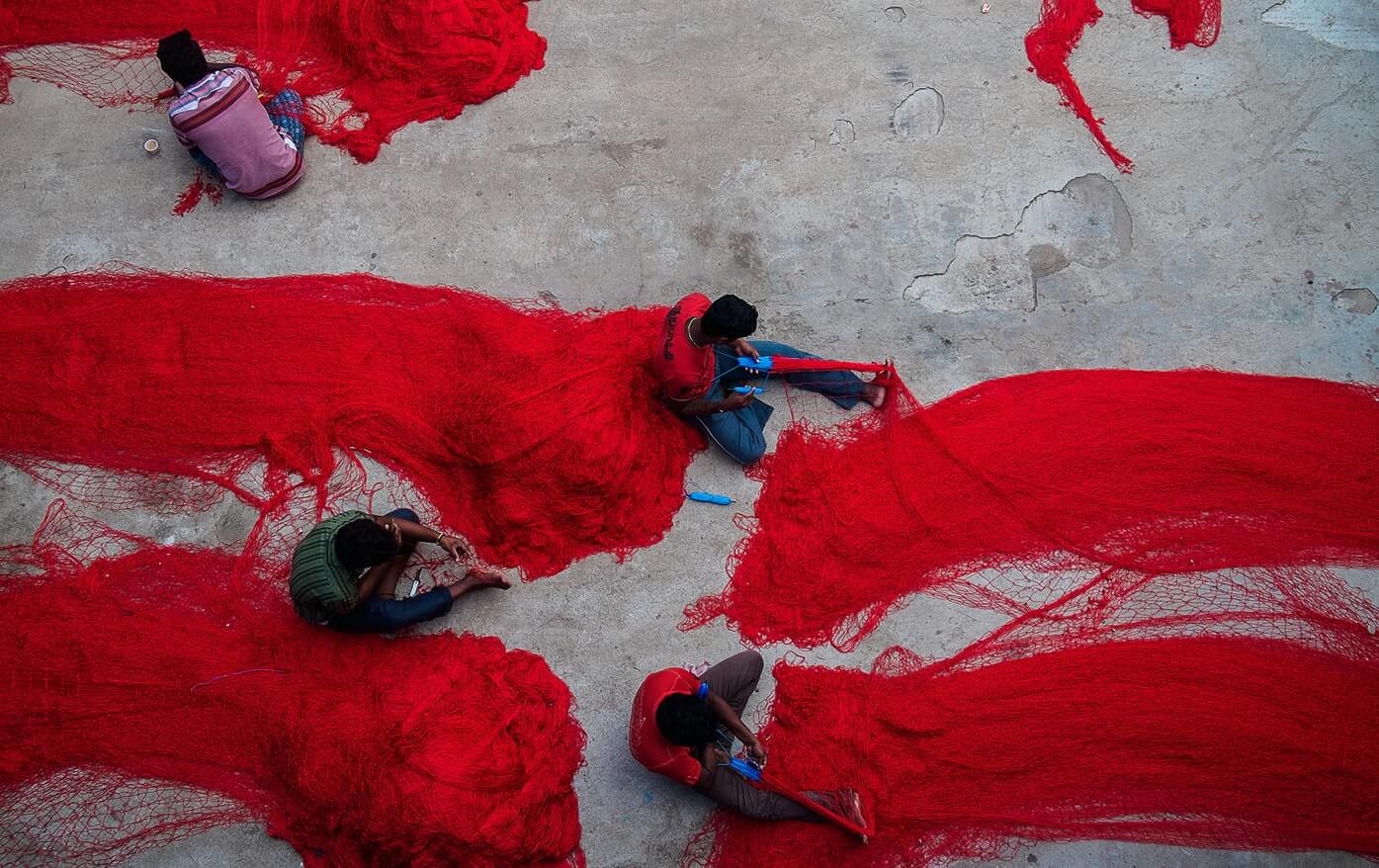
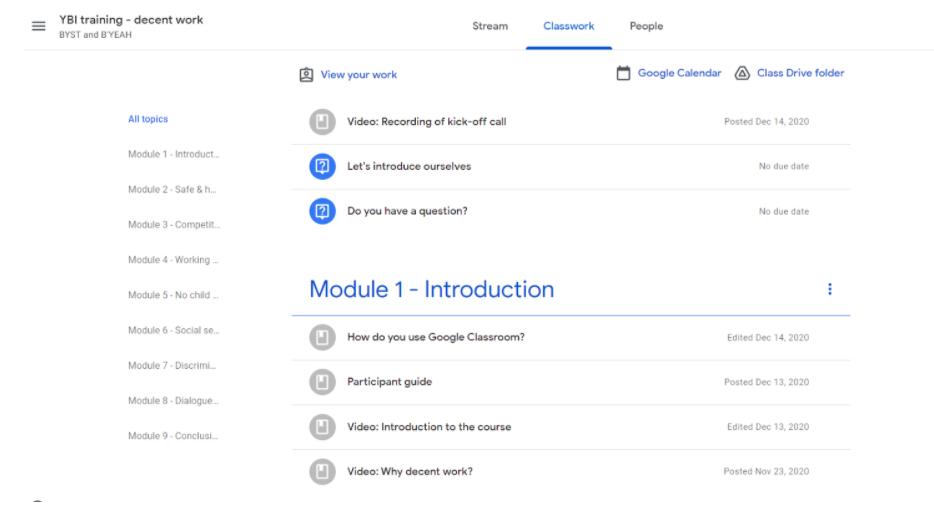
After finding that the entrepreneurs, especially in India, saw Decent Work through the lens of building a sustainable business, the team sought to strike a balance between Decent Work as a human right and as a net positive for businesses, tying Decent Work to building a sustainable, long-term business strategy. Standards such as Occupational Health and Safety were easily relatable to the latter, while other issues, such as the right to social dialogue, needed to be seen in a context of long-term business growth. Specific issues such as employee absences and the lack of written contracts due to high illiteracy rates are easier to resolve by business associations themselves.
In cases of high rates of illiteracy, business associations could provide guidance on pictorial and verbal contracts employing widely available tools such as cell phones to record agreements.Interestingly enough, child labor and forced labor were not considered to be a problem within the entrepreneurship constituency supported by B’YEAH and BYST, as well as among the program staff themselves. At the same time, the issue of child labor was found to be problematic in the contexts of both countries. To the team, it did not become sufficiently clear from a distance if the issues were not applicable to the selected businesses at all, or if a difference in interpretation (e.g., family helping out in the business, including younger siblings/children) was causing this discrepancy. Therefore, the team did choose to address these issues, specifically regarding the involvement of family members in the business, in the training.
With travel being restricted due to Covid-19 measures, the choice for an online training program was necessary. Instead of conducting live training sessions over a limited number of days, the team made the choice to record the modules and use the Google Classroom environment to provide a self-paced, more flexible training program that could be adapted to the needs of the participants. Google Classroom was used by YBI in a previous training program and was therefore the preferred medium. B’YEAH and BYST decided not to go with the self-paced learning environment in their own trainings, but the modules and videos were developed in such a way that they could easily be used over a longer training period incorporating additional resources that were made available in the course, or, if desired, using only the core materials to conduct a condensed ‘capsule training’ in two or three days.
An additional advantage of pre-recording the videos was the availability of the translated versions, which B’YEAH and BYST have decided to use directly in their own training programs, to be conducted in April 2021.
Judith is a passionate development and humanitarian professional with more than eight years of experience working for actors ranging from the Netherlands Ministry of Foreign Affairs to INGOs, where she has worked on program design and development, policy development, and program management. She is an expert in the fields of improved business development, access to the labor market through higher education, humanitarian aid, and justice and security governance.
Holding a MSc in Conflict Resolution and Governance at the University of Amsterdam as well as a BSc in Political Science and a BA in Middle Eastern Studies from Leiden University, her experience focuses on fragile regions in the Middle East, South East Asia, and Sub-Saharan Africa, where she has lived and worked over the past decade for various NGOs.
Judith has extensive experience in developing and initiating projects, including scoping potential partners, finding a program’s unique selling point, and grant-writing. When it comes to project implementation, Judith is highly passionate about working with those actors on the ground who can make a real difference.
We built Lysta as an answer to one of our own problems: the need to quickly assemble teams of experts across various subject matter, geographic, linguistic, and thematic areas for projects and proposals as they arise. We quickly realized that we were not the only ones facing this challenge! With the speed that development projects require hiring, turnaround, and technical insights, we see first hand how helpful it is to have a ready-made database of vetted experts to call on.
For existing and potential Clients, you can access all consultant full profiles by signing up here as a client for free.
For consultants, adding your profile to Lysta means jumping to the top of the list for our clients in recruitment processes. We do the heavy lifting: the CV reviews, interviews, vetting, and personnel management; so when our clients come to us, they know they’re hiring someone they can trust to deliver high quality, timely results. Click here to add your profile for review.
We’re proud to be a link in the chain that connects the best of the best – don’t hesitate to reach out and see how you can put Lysta to work for you!